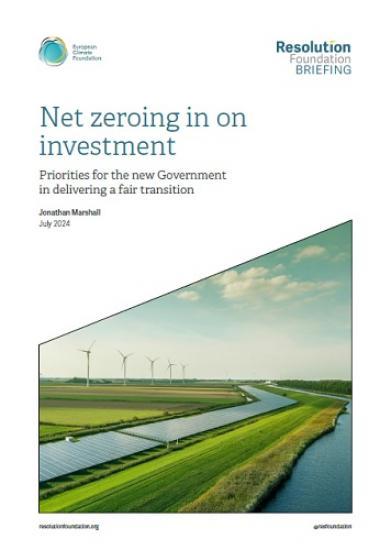Net Zeroing In On Investment - Priorities For The New Government In Delivering A Fair Transition
23rd July 2024

A new Resolution Foundation paper details some of the major challenges facing the new Government as it sets out policies to decarbonise the UK economy at the pace required by our legally binding carbon targets.
It assesses recent trends in decarbonisation and how they will need to change in the future, how this could impact the living standards of households on low- to middle-incomes, and steps that should be taken over the next five years to ensure that the burden of decarbonisation does not unduly fall on poorer families.
It finds that overall investment levels will need to increase four-fold on those seen since 2010, but that higher upfront costs could limit the affordability of low carbon technologies to those with lower means. As such, effective targeting of support should be a priority, something that successive governments have failed to deliver effectively in recent years.
It also shows that, with the majority of low carbon infrastructure planned for areas in which the population is wealthier and older than the national average, methods to encourage communities to host new developments should be mindful of potentially negative distributional outcomes.
Key findings
The next phase of the net zero transition requires decarbonisation in more areas than has been the case historically. Major progress is needed in homes, transport and electricity, but these sectors account for close to 70 per cent of the carbon footprints of lower- and middle-income households.
Upfront costs will be a big deal for households in the future: initial expenditure on a heat pump comprises 40 per cent of total lifetime costs, compared with 17 per cent for a gas boiler.
Poorer households will need help navigating this outlay, but the UK has a poor record on effectively targeting support at those in need.
And financial incentives mooted to assuage communities' concerns over new infrastructure, if applied too generously for renewable energy projects, could see older and richer households overcompensated by their poorer and younger counterparts.
Read the full report HERE
Pdf 17 Pages
